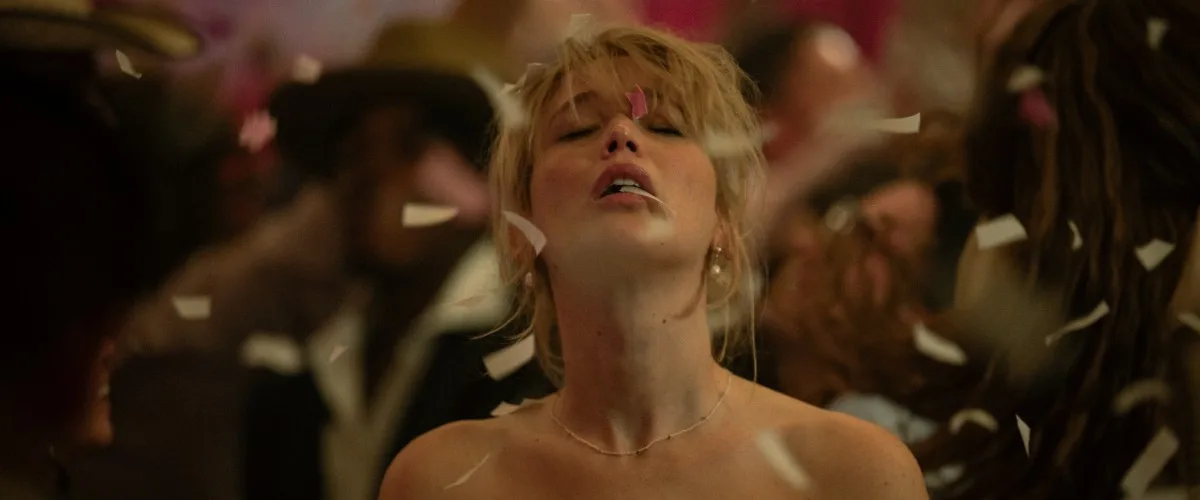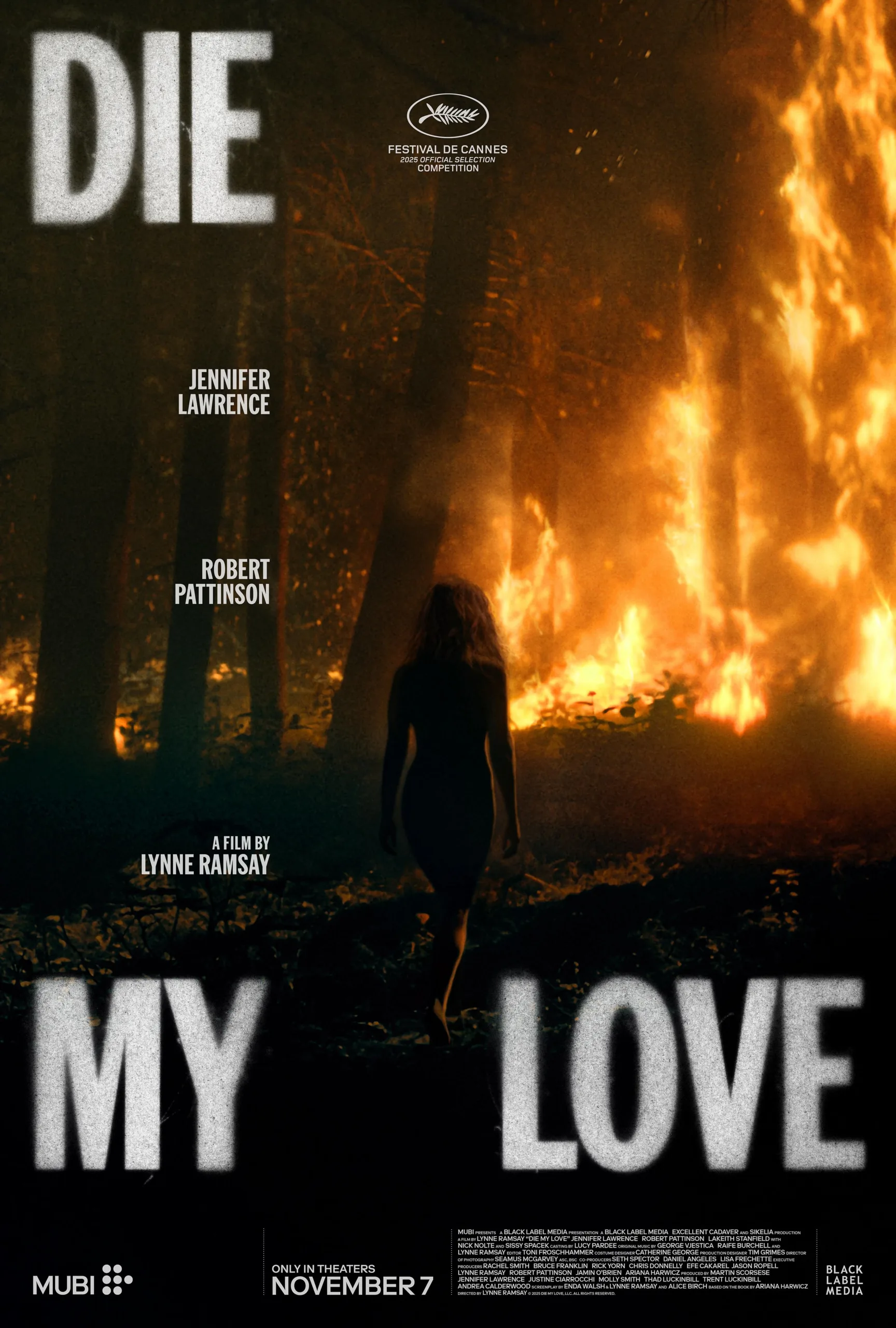Lynne Ramsay‘s restless, hallucinatory “Die My Love” features a scene where Grace (Jennifer Lawrence) and her boyfriend, Jackson (Robert Pattinson), attend a children’s birthday party with their baby. The party is populated by people like them, young parents with kids. But Grace’s behavior is volatile and strange: she lets a stranger hold her baby and then wanders off, drinking wine, staring around her, bristling with contempt or boredom. Grace is practically in an altered state, and her day-to-day experience of being a parent is clearly unmentionable to people who manage it so effortlessly. A well-intentioned woman says to Grace sympathetically, “People don’t talk about how hard being a parent can be.” Grace says, bluntly and rudely, “That’s all anyone ever talks about.”
It’s a funny line. Grace is often funny. Everyone knows about post-partum depression and post-partum psychosis. These conditions are well-covered in the media, women’s magazines, and medical journals. There are support groups. There is medication. However, this doesn’t mean there’s any less stigma attached to darker, more uncontrollable feelings and behavior. Admitting you’re sleep-deprived and you cry all the time is within the bounds of normalcy. You’ll get sympathy. But if you share that you crawl through the grass, clutching a kitchen knife, while staring at your baby across the lawn … as Grace does in the opening scene of “Die My Love” … watch everyone clam up. Watch everyone judge. Mental illness is de-stigmatized only when it presents in socially acceptable ways.
This all makes Ramsay’s film sound like a teachable-moment issue-of-the-week film. But Ramsay is far too visceral a filmmaker for that, and the energy of “Die My Love” is unruly and aggressive. Adapted from Ariana Harwicz’s award-winning novel, “Die My Love” isn’t so much about Grace’s experience as it is a subjective expression of what it is like for Grace from the inside. In this world, barely any “thinking” happens. It’s all physical impulse, and the primacy of the body’s needs.
Lawrence has often been called “earthy”, and what that means is up for grabs, depending on the context. The sense that she is very much in her body has made her an unpredictable, spontaneous onscreen presence—sometimes sexy, sometimes goofy, sometimes clumsy. She’s not careful or ladylike. This is genuine (which doesn’t mean it’s not schtick, either). But darker shadings are now coming into play, and things could get very interesting. As Grace, Lawrence is so “earthy” she’s practically turning into mud before our eyes, like an alchemy experiment gone awry.
The film starts with a static camera shot, showing Jackson and Grace, pre-baby, wandering through the house he inherited from a relative. It is out in the country and needs a lot of work. Ramsay doesn’t give us any close-ups. We hear them talking to each other as they walk through the empty rooms. Jackson is full of plans, but is maybe over-compensating, and she seems a little listless, like she can’t imagine living there. Then, they have rambunctious wild sex (and, presumably, make a baby). We have no idea about their backstory, but we really don’t need it. Their dynamic has the comfort of familiarity, and their sex feels like a real release, like pure communication. When that communication ceases, Grace wilts. She doesn’t know who they are as a couple without it. Before long, Jackson has a job that requires a lot of time on the road, and Grace is stuck at home. Jackson brings home a dog. The dog never stops barking. And Grace starts to lose her mind.
Jackson’s mother Pam (Sissy Spacek) is the only one who sees that Grace might not be handling things well. Pam is hearty and practical, but lately she’s been waking up in the middle of the night, wandering down the road far from home, a rifle in her hands. Spacek is eerie and luminous in these frightening sequences. The boundary between sleep and consciousness dissolves. This shows up, too, in Grace’s recurring fantasy of a motorcyclist (LaKeith Stanfield) vrooming by her house, slowing down to stare at her through his impenetrable helmet. Maybe it isn’t a fantasy. Maybe it’s really happening. But if you ache to have sex and your husband won’t touch you, the distinction hardly matters.
The novel is told in the first person and reads like the proverbial bat out of hell. The narrator’s obsession with bodies and their fluids, the unavoidable reality and eroticism of filth and dirt, calls to mind the work of Otessa Moshfegh or Charlotte Roche, but the voice has a biting mean-girl quality reminiscent of the best of Sylvia Plath. (At one point, a fed-up Grace declares, “If I could lynch my whole family to be alone with Glenn Gould, I’d do it.”) The novel was adapted by Irish screenwriter and director Enda Walsh (“Small Things Like These“) and Alice Birch (who worked on television adaptations of two of Sally Rooney’s novels). The book’s verbal tone is somewhat diluted in the film, but Ramsay and cinematographer Seamus McGarvey more than make up for it by creating an unrelenting fever dream out of Jackson and Grace’s surface-level “idyllic” country life.
Everything is vivid, but nothing is beautiful or soothing. The nighttime scenes have an almost silvery sheen: it’s dark but not dark. The light is in between and uneasy. What should be idyllic is a scary void. Both Jackson and Grace deteriorate, but Grace’s descent is more dramatic and less socially acceptable. Her hygiene is not the best. The film does the right thing by not diagnosing her. Grace’s deterioration—and Lawrence’s complete commitment to it—calls to mind Catherine Deneuve’s performance in “Repulsion,” a personal gold standard in the sparsely populated “feral women in cinema” landscape. Lawrence is an unruly presence, and her impulsiveness here (which serves her so well as a comedienne) makes her seem dangerous and reckless.
“Die My Love,” like its source material, is close first-person. We never get a break from Grace’s perspective.
None of this is easy, and not much of it is fun. But “Die My Love” is a wild and worthwhile ride.




















